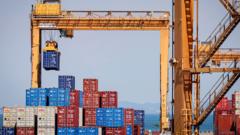The World Trade Organization warns of a decline in global trade for 2025, primarily influenced by tariffs imposed by the US. Predictions indicate a particularly steep drop in North America while highlighting that regions like Asia and Europe may still experience some growth.
WTO Forecasts Global Trade Decline Due to US Tariffs

WTO Forecasts Global Trade Decline Due to US Tariffs
Concerns rise as WTO cites US-China trade tensions could trigger a significant reduction in global commerce.
The World Trade Organization (WTO) has issued a stark warning regarding the trajectory of global trade, forecasting a contraction this year stemming from tariffs imposed by the United States. WTO officials expressed significant concern over the deteriorating relations between the US and China, with director-general Ngozi Okonjo-Iweala describing the ongoing "decoupling" as deeply troubling.
Previously, the WTO anticipated a 2.7% growth in global goods trade by 2025, but this has since been revised to a potential drop of 0.2%. The implications of US tariffs, which recently hit a baseline of 10% on nearly all imports, coupled with retaliatory measures from affected countries, have led to fears of heightened economic uncertainty. Chief economist Ralph Ossa noted that uncertain trade policies hinder economic growth and lead to weaker trade flows.
Despite these grim predictions, the WTO identified regions where trade may still expand. Asia and Europe are projected to show modest increases in both exports and imports, contributing positively to the overall trade landscape. For the first time, the WTO also predicted a 4% growth in services trade by 2025, albeit lower than earlier estimates.
The impact of US tariffs, particularly affecting relations with key trading partners like China, has already begun to show. The US stock market reacted negatively to the news, reflecting investor concerns. While the Trump administration claims that tariffs will boost local manufacturing and generate revenue, critics argue that the complexities involved in reshoring production could hinder economic performance in the short term.
In summary, as global trade faces peril from escalating US tariffs, regional dynamics suggest resilience in specific areas, yet overall uncertainty looms large.






















